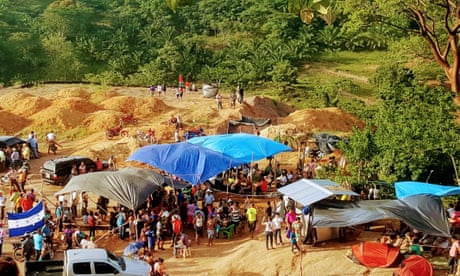Colombia was the deadliest country and a fifth of the 177 recorded killings took place in the Amazon rainforest, says Global Witness

An environmental protest in Brasilia, Brazil, April 2022. Almost 90% of all killings were recorded in Latin America. Photograph: Andressa Anholete/Getty Images
Patrick Greenfield
@pgreenfielduk
Wed 13 Sep 2023
At least 177 people were killed last year for defending the environment, according to new figures, with a fifth of killings taking place in the Amazon rainforest.
Murdered by organised crime groups and land invaders, environmental defenders were killed at a rate of one every other day in 2022, figures from the NGO Global Witness show. Colombia was the most deadly country, recording 60 murders.
Indigenous communities were disproportionately represented in the figures, making up 34% of all murders, despite representing about 5% of the world’s population. The new figures mean that at least 1,910 environmental defenders have been killed between 2012 and 2022, according to Global Witness, with most of the murders going unpunished.
Brazil, Mexico, Honduras and the Philippines were the most deadly countries in 2022 after Colombia. Nearly 88% of all lethal attacks were recorded in Latin America, including the killings of the Brazilian activist Bruno Pereira and the journalist Dom Phillips in July.
The figures are a drop from the 200 killings recorded in 2021 but remain high, prompting Global Witness to call for special protections for environmental defenders of climate-critical ecosystems.
The report highlights the scramble for resources in Latin America, Asia and Africa as a driver of the violence, including the extraction of rare earth minerals used in the production of electric cars and wind turbines.
“For too long, those responsible for lethal attacks against defenders have been getting away with murder,” said Shruti Suresh, the co-director of campaigns at Global Witness.
“Despite being threatened by irresponsible corporate and government actions, this global movement of people, united by determination and a commitment to defending their homes and communities, are standing firm – and they cannot and will not be silenced.”
The report has been produced annually for the past 11 years by Global Witness, which is urging governments to enforce existing laws to create a safe environment for people trying to protect their lands and ecosystems. It called for businesses to ensure their supply chains and activities are not involved in driving the violence.
Underreporting of attacks around the world means that the figures are likely an underestimate, especially for Africa and Asia. Non-lethal attacks to silence environmental defenders were probably far higher, but hard to record, Global Witness said.

Honduran environmental defenders shot dead in broad daylight
Laura Furones, a forest governance expert who advised on the report, highlighted attacks against Indigenous communities as a particular cause for concern.
“Research has shown again and again that Indigenous peoples are the best guardians of the forests and therefore play a fundamental role in mitigating the climate crisis,” she said. “Yet they are under siege in countries like Brazil, Peru and Venezuela for doing precisely that.
“If we are to keep the forests standing, we must recognise that this relies upon the protection of those who call the forest home.”
Find more age of extinction coverage here, and follow biodiversity reporters Phoebe Weston and Patrick Greenfield on Twitter for all the latest news and features
No comments:
Post a Comment